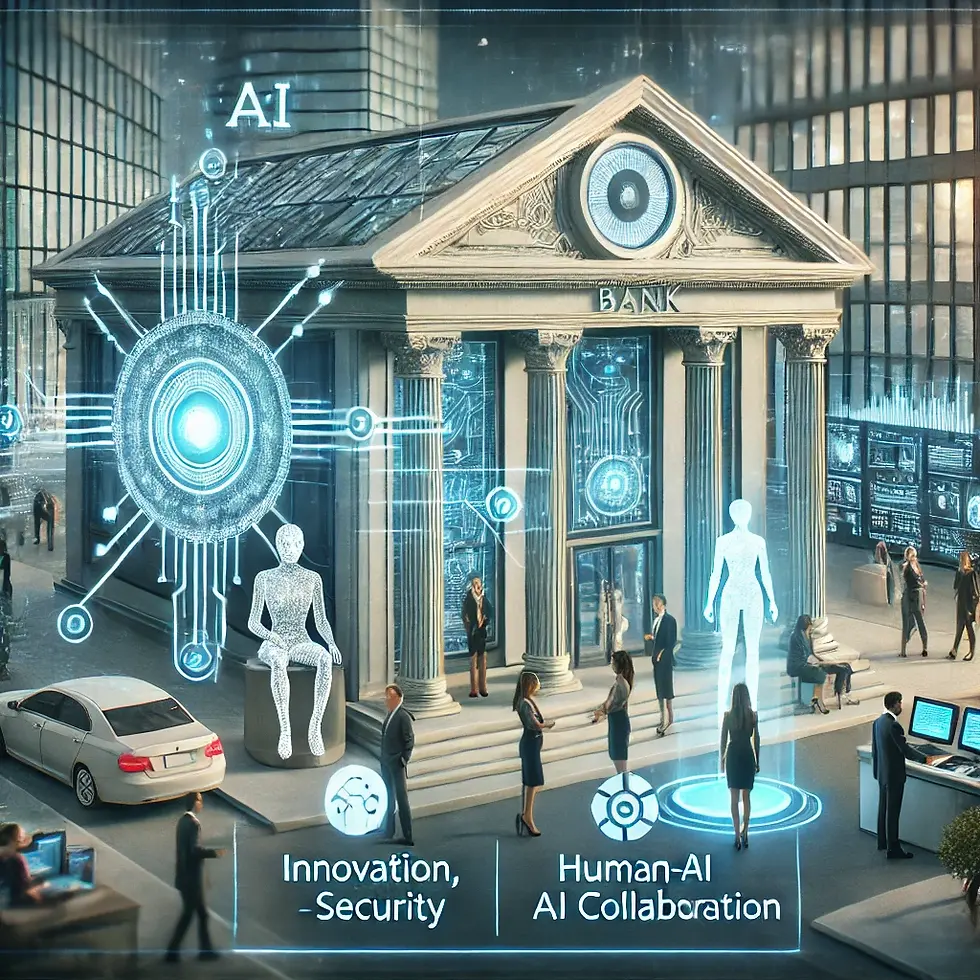The Human Edge in the AI Era: How AI and Human Intelligence Shape Banking’s Future
- Balaji Sampathkumar

- Feb 28, 2025
- 4 min read
AI is taking over banking. Chatbots handle customer queries. Algorithms process loans. Robo-advisors manage investments. Every corner of operations is being automated. But let’s get real—AI isn’t replacing humans. It’s making them more valuable than ever.
A banking CEO summed it perfectly: AI is great at processing data, but trust, relationships, and strategic decision-making? That’s still a human game. The banks winning today aren’t just using AI. They’re doubling down on what humans do best.
AI Is Not a Threat—It’s a Catalyst
Automation anxiety is everywhere. People fear being replaced. But history says otherwise. Every major technological shift has created more high-value jobs than it eliminated. AI is no different.
Routine work? Automated.
Complex decision-making? Still human.
Transactional interactions? AI-driven.
Trust-building? Still human.
The future of banking is not AI vs. humans. It’s AI + humans. The best professionals are the ones who know how to use AI as a tool—not compete with it.
The Human Capabilities That AI Can’t Replicate
AI is fast and precise, but it lacks the one thing that makes a professional indispensable—human intelligence. These five skills will define the future of banking.
1. Adaptability: The Ultimate Career Insurance
The banking industry never sits still. New fintech disruptors, shifting regulations, changing customer expectations—AI is just another wave in this storm.
The professionals who thrive adapt. They learn, unlearn, and relearn faster than the industry evolves.
Think about COVID-19. Overnight, physical banking shut down. Teams had to pivot. Digital services, remote advisory, new loan structures—it was survival mode. Those who adapted stayed ahead. Those who resisted? They got left behind.
In a tech-driven world, adaptability isn’t optional. It’s the price of entry.
2. Critical Thinking: AI Predicts. You Decide.
AI is only as good as the data it’s trained on. Garbage in, garbage out. That’s where human judgment comes in.
Take credit risk models. AI analyzes patterns, flags risks, and predicts outcomes. But anomalies happen. Economic shifts. Market crashes. Unexpected variables. A solid risk manager knows when to override AI’s suggestion.
AI provides data. Humans provide judgment.
And judgment is everything in Banking. The ability to ask the right questions, challenge assumptions, and think beyond the algorithm—that’s what separates top professionals from machines.
3. Emotional Intelligence: Banking Is Built on Trust
AI can recommend investments, but will it calm an anxious client during a market crash? No. Can it build trust in a high-stakes negotiation? No.
Banking runs on relationships. Trust, empathy, and persuasion—these are human strengths.
As banks automate front-end interactions, the human touch becomes a premium service. Customers still want to talk to people when it matters, and an advisor who can reassure, guide, and empathize is irreplaceable.
The best professionals aren’t just number crunchers. They’re relationship builders.
4. Creativity: AI Optimizes. Humans Innovate.
AI is great at finding patterns and refining processes. But true innovation That’s human.
Banking isn’t just about efficiency. It’s about differentiation.
New financial products.
New customer experiences.
New risk models.
These don’t come from AI. They come from humans who see beyond what exists today.
Look at digital-only banks. They didn’t just digitize traditional banking. They reimagined it. AI played a role, but human creativity led to personalized banking experiences, micro-investing platforms, and new lending models.
5. Ethics & Judgment: Who Keeps AI in Check?
AI isn’t neutral. Bias exists. Data can be flawed. Who makes sure AI-driven decisions are fair and compliant? Humans.
Banking is built on trust. AI might recommend an investment strategy, but humans must ensure it aligns with client needs and regulatory requirements. AI might automate loan approvals, but humans must ensure discrimination and bias aren’t baked into the system.
Regulators are already watching this closely. Banks must be accountable for how they use AI. The professionals who understand AI and question it when needed will lead the future of banking.
Upskilling: The Key to Staying Ahead
The best professionals aren’t competing with AI. They’re leveraging it.
Banks know this, so they’re investing billions in upskilling. AI literacy, data analytics, and soft skills training are now standard.
The In-Demand Skills for the AI Era:
Data & AI Literacy – You don’t need to code, but you need to understand AI-driven insights.
Critical Thinking – AI provides answers. You validate them.
Emotional Intelligence – Trust matters more than ever. Clients want advisors, not bots.
First-Principles Thinking – Forget how things have always been done. Rebuild from scratch.
On-the-Job Learning – The best professionals continuously adapt through mentorship, cross-training, and exposure to new challenges.
The Future of AI and Human Intelligence in Banking
Let’s be clear: AI isn’t here to replace banking professionals. It’s here to augment them.
The professionals thriving in this AI era aren’t the ones clinging to old ways. They are the ones who embrace AI while sharpening their uniquely human edge—adaptability, creativity, emotional intelligence, and ethical judgment.
The future of AI and Human Intelligence in Banking is now and here. The choice is clear:
🚀 Adapt, evolve, and lead—or get left behind.
AI will change Banking. But humans will always drive it forward.




Comments